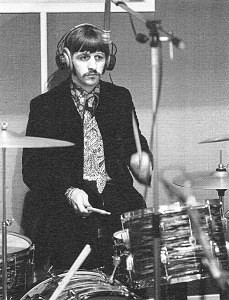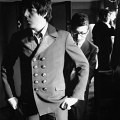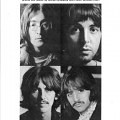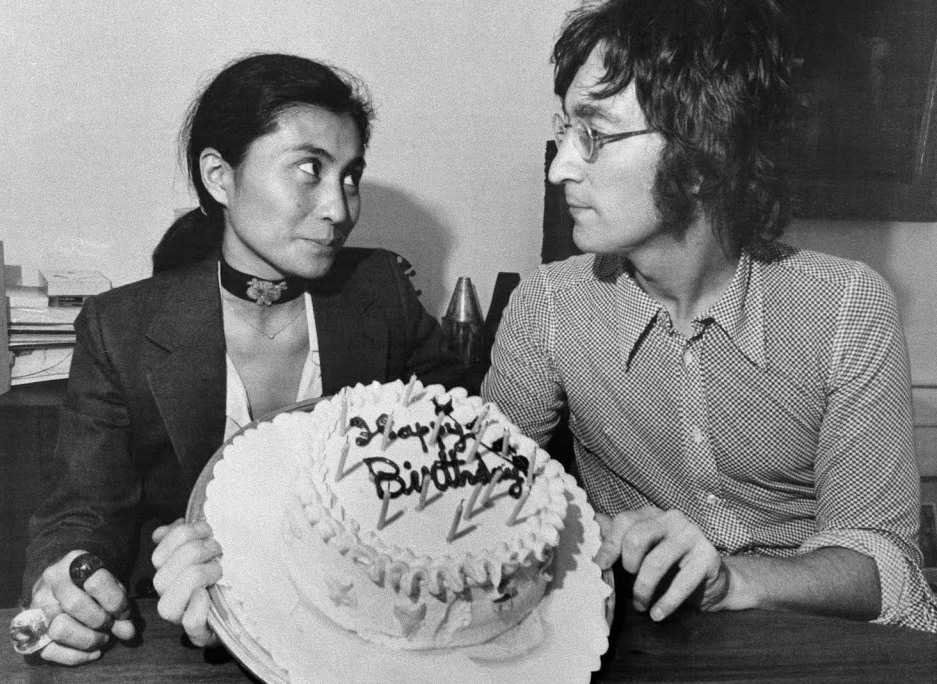- What John Lennon Thinks of Donald Trump - November 14, 2016
- The Meaning of Fun: The Paul is Dead Rumor - February 3, 2016
- BEATLES-STREEP-SHEA SHOCKER: IT’S NOT HER!!!! - August 13, 2015
DEVIN McKINNEY • Hey! Let’s all wish Ringo the best on his 74th birthday. He’s still on tour, still looking great, still showing those peace fingers and giving a plug for love wherever he goes.
I wrote a little birthday tribute to Ringo over at HiLobrow, a pop-culture site where I often contribute (edited by the great Josh Glenn, a guest contributor of ours). I hope you’ll pop over and check it out.
Here’s something else I’ve wanted to say for a long time about Ringo, and it’s exclusive to Hey Dullblog.
Once, not more than a year or two ago, a vision came to me. It wasn’t a man on a flaming pie; for that matter, it wasn’t really a vision at all. More an idea. But it was more than an idea—it was a truth. No, it was more than a truth. It was The Truth. And The Truth, as always, was, once revealed, indubitable and unanswerable, at least by me.
 The Truth was that “The Weight,” anchor track of The Band’s historic 1968 debut album, Music from Big Pink—one of the most acclaimed of all popular songs, a standard of the late ‘60s rock repertoire, highlight of the Easy Rider soundtrack, coveted and covered by artists from Joe Cocker to Mumford & Sons, John Denver to Dionne Warwick, the Grateful Dead to Hanson, Aretha Franklin to Waylon Jennings—was no less than a rewrite, in terms taken from and just recognizable as populist Americana, of “A Day in the Life.”
The Truth was that “The Weight,” anchor track of The Band’s historic 1968 debut album, Music from Big Pink—one of the most acclaimed of all popular songs, a standard of the late ‘60s rock repertoire, highlight of the Easy Rider soundtrack, coveted and covered by artists from Joe Cocker to Mumford & Sons, John Denver to Dionne Warwick, the Grateful Dead to Hanson, Aretha Franklin to Waylon Jennings—was no less than a rewrite, in terms taken from and just recognizable as populist Americana, of “A Day in the Life.”
The songs sounded so different, yet were so much the same. Each was about the journey through a friendless, loveless landscape of a lost man, a confused wanderer whose need—peace of mind—couldn’t be simpler or more impossible. Turn the lyric this way, the journey is comical; turn it that way, it is hellish.
 Sgt. Pepper came out a year (to the day) before Big Pink; musician Al Kooper, reviewing Big Pink in Rolling Stone on its release, immediately noted the Beatle influence embedded within it. (And I think it’s quite likely that the “Next of Kin” photograph on the inner gatefold, a large group shot of the Band members with their families, was a conscious or unconscious answer to the Pepper cover.) But I don’t think anyone has pointed out how “The Weight” seems to rewrite—not point for point, but as an essence, a narrative, a pristine modernism repositioned as a vernacular folk tale—“A Day in the Life.”
Sgt. Pepper came out a year (to the day) before Big Pink; musician Al Kooper, reviewing Big Pink in Rolling Stone on its release, immediately noted the Beatle influence embedded within it. (And I think it’s quite likely that the “Next of Kin” photograph on the inner gatefold, a large group shot of the Band members with their families, was a conscious or unconscious answer to the Pepper cover.) But I don’t think anyone has pointed out how “The Weight” seems to rewrite—not point for point, but as an essence, a narrative, a pristine modernism repositioned as a vernacular folk tale—“A Day in the Life.”
The second Truth that came to me, no less important than the first, is that Levon Helm’s drumming on “The Weight” owes, if not everything, then much to Ringo’s work on “A Day in the Life”—which I grow more convinced with each year is the greatest rock drumming that’s ever been done. In particular, the subtle rolls and fills that Helm uses to populate the bars between lines; and the slack, hollow single beats that mark distance between verses—the first sounding the submerged anxiety and fear of the narrative, the second the mute human need to move, to put one foot in front of the other, to make time as a way of staying, and being, alive.
Not that Helm didn’t have a panoply of other influences—Southern and Northern, rock-oriented and country-oriented and R&B-oriented—to draw from; not that he didn’t bring his personal style and intuitive brilliance to all that he did. But the Ringo influence here is, to my ears, so ringingly evident that it made me hear both “A Day in the Life” and “The Weight” in a new way.
And made it so sweetly logical that Ringo and Levon should have been such good friends for so many years, with Levon a mainstay on Ringo’s All-Starr tours. (I’d love to have been a fly on the wall as the two sat and drank and smoked and talked about Arkansas and Liverpool, blues and country, drumming and down-home stuff.)
And brought to mind again how little credit Ringo has gotten through most of his career for being the singular and irreplaceable instrumental genius that he is.
And reminded me that, even if fans and critics have often disdained him in their eagerness to prove that they know what rock drumming is, other drummers have never held Ringo in anything but the very highest regard.
Those who know, know.
Happy birthday, Ringo.













He’s gonna be at Capitol Records at noon! If I leave now I can JUST MAKE IT…
Your HiLoBrow appreciation winds up on what I always think about Ringo — how he has “always accepted gracefully the gifts bestowed by talent and timing — two intangibles of which he is master.” It’s this grace that sets Ringo up for all the jokes; in a business which attracts and feeds off of insecurity, Ringo has always seemed aware of exactly who he is. I think that’s why he was the glue of the group, and it’s probably why we always see him as smaller than he truly is.
And it’s why Ringo’s been able to conquer (or at least battle to a draw) some of the demons that John could not. But we dock him for it; Icarus is who we remember, not the other guy who wised up and turned back.
Eloquent as always, Mike.
“…brought to mind again how little credit Ringo has gotten through most of his career for being the singular and irreplaceable instrumental genius that he is.”
Would be great if that were about to change, but The Internet Commentariat is still likes to discredit Ringo’s abilities at every opportunity. I read a discussion re. the upcoming “new” Pink Floyd album on avclub.com today – here’s an excerpt:
COMMENTER 1
Wright definitely doesn’t get as much credit as he deserves, he’s kind of the George Harrison of the group where he didn’t have as much output creatively but when he did it was always solid.
COMMENTER 2
Richard Wright was fucking incredible. So much talent. I saw the Flaming Lips covering Dark Side of the Moon on the TV a while back. They had like 6 keyboard players on stage and they could not do what Wright did by himself.
COMMENTER 3
Yeah, considering Waters is Lennon to Gilmour’s McCartney, that comparison makes sense.
COMMENTER 4
Hey, hey, let’s not equate Nick Mason with Ringo…
COMMENTER 3
Well, he was certainly a better drummer than Ringo, but he occupied the equivalent position in the band, as far as relative creativity and influence go. Although, Ringo sang a few songs. Mason just had the goofy (though awesome) line in “One of These Days”.
I am truly unapologetic in my fondness for just about everything that says Pink Floyd on it and don’t have a very good idea of what makes a rock drummer “great”, but even I know that Nick Mason is/was certainly not a better drummer than Ringo. They even had to get session musicians in for relatively straightforward songs like “Mother” (from “The Wall”) or “Two Suns In the Sunset” (from “The Final Cut”), apparently because Nick was uncomfortable with the slightly more complicated time signatures. I don’t think he would have been able to cope with “She Said She Said”, “Happiness Is a Warm Gun” or “Here Comes the Sun”. Yes, I know – OMG SOMEONE WRITES RUBBISH ON THE INTERNET. Sigh.
Thanks, @Velvet — this exchange reveals to me why reading AV Club always makes me slightly depressed. The writing in AV Club is always very good, and the commenters — if “funny” in the same meme-y, slightly borrowed way that Cards Against Humanity is funny — are a cut above the usual peanut gallery. But the whole thing reminds me of freshman year in college, where everything everybody said was really about what they wanted you to think about them, and cementing everyone into a hierarchy. This makes perfect sense, cyberspace being largely created in precisely that environment by precisely those people. There’s a callowness about it, a stunted quality, and a weird pounding-down. If you know the received wisdom on the topic, you know what everybody’s going to say before reading the thread.
Some days the whole internet feels to me like a bunch of people debating whether the uniforms were cooler on ST:TNG or the original series, and what it means about you if you like the wrong type. (I recognize the irony of this being said on a comment thread of a Beatles fan blog.) But this is why Ringo, and to a lesser extent, Paul, will never get their due on the ‘net: liking them doesn’t transfer any laudable qualities to the liker.
The whole thing has nothing to do whatsoever with the culture in question: My wife used to work in the writer’s room for Breaking Bad, and she’d occasionally post (pseudonymously) answering fan questions about why this or that had happened on the show, long after airing. “The writers felt that…” Commenters would attack the crap out of her, and insist that she knew nothing — because they weren’t really interested in the real reasons; it was all imputed meaning, all psychodrama.
This is not one of the world’s greater injustices — except for the fact that all those pixels must add up to something, and it’s not better pop culture. BB wouldn’t have become the show it became if the writer’s strike hadn’t shrunk its first season; and if it hadn’t had 2.5 years of relative obscurity to plan itself out. By the time people went crazy for it, the arc was already planned. That’s impossible for a music group, or anything ongoing. That people on the AV Club — the best the internet has to offer, from a mass-market standpoint — revert to commonplaces re: Ringo is…well, it’s exactly what you’d expect, right? It used to be we could assume that under the dopey conventional wisdom there were all these smart people without a voice; now we know that’s not true, and if you work in pop culture, it gives you pause. Are you creating the show for the guys who dig Walt as a revenge fantasy — or in spite of them?
Thank god the internet didn’t exist in the Beatles era, and I’m not just talking about John’s inability to stay off Twitter. Great stuff requires a solitude and an ability to hear one’s own voice (and only one’s own voice) that today’s vocal and empowered fan culture seems to work actively against.
My best/worst example of a senseless, gratuitous Ringo-bash is the tidbit in the Village Voice‘s Pazz & Jop Poll, circa 1993, referring, I think, to Nirvana’s In Utero, wherein the writer claimed that “this is what the Beatles might have sounded like if they’d had a decent drummer and a deeper commitment to the bottom end.”
I don’t remember the writer, but his sentence, which fails to so much as brush up against validity on any of its points, has always been imprinted on my brain. For 20 years I’ve been turning it over with mental tongs, looking at it from different angles, trying to make it yield something other than obnoxious meaninglessness. No luck so far.